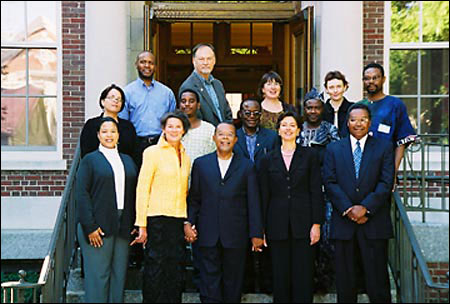Du Bois Institute announces 19 fellows for 2005-06

Henry Louis Gates Jr., director of Harvard’s W.E.B. Du Bois Institute and chair of the Department of African and African American Studies at Harvard University, has announced the appointment of 19 new fellows for the 2005 – 06 academic year. “We are particularly delighted with this year’s selection of Du Bois Institute Fellows. They are an international group of fellows whose work embraces the diasporic and intellectual richness of African and African American Studies, including scholars from Brazil, the Democratic Republic of the Congo, France, Nigeria, Rwanda, and South Africa, as well as from the United States,” Gates stated. “The interdisciplinary breadth of their fellowship projects encompasses areas such as African and English literature, African film, art history, archaeology, education, and international law and Civil Rights. We look forward to the distinguished contributions that this group of scholars will undoubtedly make to Harvard’s intellectual life.” Since its creation in 1975, the Du Bois Institute has annually appointed scholars who conduct individual research for a period of up to one academic year in a variety of fields within African and African American Studies. The institute accepts established and emerging scholars from both the humanities and social sciences. Fellows conduct their research by using resources from Harvard’s extensive library system as well as from the institute’s research projects, including the African Art Database, the Image of the Black in Western Art Research and Photo Archive, the African AIDS Initiative International, and the African American National Biography Project. Du Bois Fellows also participate in the varied activities of the institute including public conferences, lectures, readings, and forums. The 2005 – 06 Du Bois Fellows and their research projects are as follows:Syl Cheney-Coker, fellow, Villa-Aurora Foundation for European-American Relations, Sheila Biddle Ford Foundation Fellow, “Our Lady of Diamonds, Demystifying the Lure: SACRED RIVER.”Bobby Donaldson, assistant professor, University of South Carolina, Sheila Biddle Ford Foundation Fellow, “New Negroes in a New South: Race, Power, and Ideology in Georgia, 1890-1925.”Stanley Engerman, professor, University of Rochester, Sheila Biddle Ford Foundation Fellow, “Social and Economic Progress of Black America.”Ronald Ferreira, assistant professor, University of Virginia, Sheila Biddle Ford Foundation Fellow, “Slaving, Trade, and Creolization in the Black Atlantic: Angola and Brazil, 1650-1800.”Maria Frias, professor, University of Coruna, Spain, Sheila Biddle Ford Foundation Fellow, “Black Nuns in Europe: From Slavery to the Convent.” Arlette Frund, associate professor, Universite Francois Rabelais Tours, Sheila Biddle Ford Foundation Fellow, “Literature and Identity.”Harry Garuba, associate professor, Centre for African Studies, University of Cape Town, South Africa, Mandela Fellow, “The Postcolonial Muse: Language, Identity and Emergence of African Literature in English.”Lesley J.F. Green, senior lecturer, University of Cape Town, South Africa, Mandela Fellow, “Space, Time and the Humanities: Innovative Teaching Approaches.”James Hefner, president emeritus, Tennessee State University, Sheila Biddle Ford Foundation Fellow, “The Black College in the Making of America.”James McCann, professor, Boston University, Sheila Biddle Ford Foundation Fellow, “African Natures: Food and the Natural World.”Samuel Ngayihembako, recteur, Universite Libre, Democratic Republic of the Congo, *Scholar-at-Risk, #8220;Fundamentalist Churches and Opposition of the Pastoral Ministry of Women.”Benjamin Ogunfolakan, lecturer and curator, Natural History Museum, Obafemi Awolowo University, Ile-Ife, Nigeria, Sheila Biddle Ford Foundation Fellow, “Patterns of Place: Settlement Strategies, Ceramic Use, and Factors of Change Among the Early Yoruba.”Melina Pappademos, assistant professor, University of Connecticut, Sheila Biddle Ford Foundation Fellow, “Alchemists of a Race: Black Cuban Political Thought & Civic Mobilization, 1899 to 1959.”Claudine Raynaud, professor, Universite Francois Rabelais Tours, France, Sheila Biddle Ford Foundation Fellow, “Pondering Color, or the Racial Subject: A Book-Length Study of Toni Morrison’s Works.”Ronald Kent Richardson, director of African American Studies, associate professor, Boston University, Sheila Biddle Ford Foundation Fellow, “Blacks and Asians: Encounters through Space and Time.” Barbara Rodriguez, assistant professor, Tufts University, Sheila Biddle Ford Foundation Fellow, “The American Slave Narrative: Slavery, Form, and the Making of American Art.”Wole Soyinka, playwright, poet, novelist, and essayist, awarded 1986 Nobel Prize in Literature, Second Alphonse Fletcher Fellow.Phyllis Taoua, associate professor, University of Arizona, Sheila Biddle Ford Foundation Fellow, “The Dynamics of Dispossession: Reflections on Contemporary African Film and Fiction.”Noel Twagiramungu, fellow, International Center for Transitional Justice (New York), African scholar, writer, and human rights advocate, Rwanda, *Scholar-at-Risk, “Gacaca or Grassroots Justice: Its Basis in International Law and Implications for Human Rights in Post-Genocide Rwanda.”*Co-appointed in conjunction with the University Committee on Human Rights Studies




